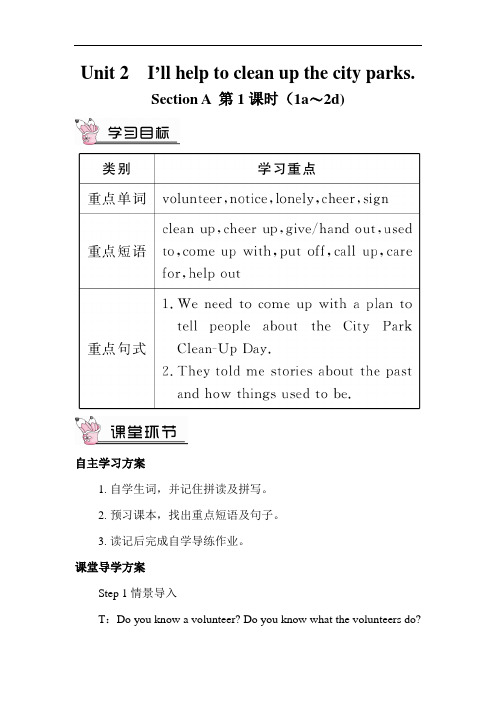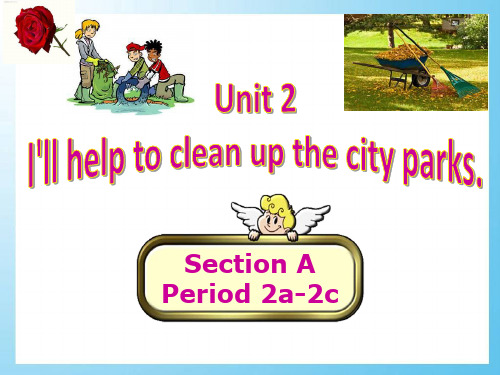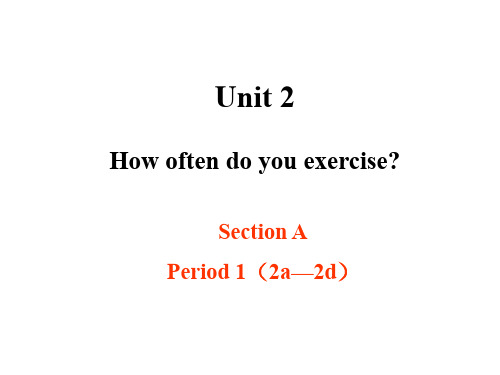Unit 2 第四课时(2a-2b)
- 格式:ppt
- 大小:1.66 MB
- 文档页数:20

Unit 2 I’ll help to clean up the city parks.Section A 第1课时(1a〜2d)自主学习方案1. 自学生词,并记住拼读及拼写。
2. 预习课本,找出重点短语及句子。
3. 读记后完成自学导练作业。
课堂导学方案Step 1情景导入T:Do you know a volunteer? Do you know what the volunteers do?S1:They help the old people.S2:They help do some cleaning.…T :What can you do? Now please talk about the questions in groups.环节说明:由志愿者的活动过渡到学生讨论的话题,衔接自然,学生易于接受,能勾起学生的学习欲望。
Step 2完成教材1a—1c的任务1. 认真观察1a中的图片,写出图片中帮助他人的方法,然后写出其他帮助他人的方式。
完成后小组内交流看谁写得多。
2. 认真阅读1b中的句子,然后听听力完成1b任务。
3. 再听一遍录音,并跟读对话。
4. 结对练习1a图片中的对话,并请一些学生表演出他们的对话。
然后模仿1b材料编新的对话并表演。
5. 小结训练。
( B )I took my sister to the concert to .A. c heer up her B . cheer her upC . cheer she up D. cheer up she环节说明:听说结合,第一时间向学生传达语言目标,通过结对对话练习和小结训练,使语言目标得以强化。
Step 3 完成教材2a—2c的任务1. 认真观察2a中的图片,然后听录音圈出他们打算要做的事情。
2. 再听一遍录音,根据录音内容完成2b中的填空,然后大声地朗读五个句子。
3. 听第三遍录音,学生跟读,然后仿照2c的形式编对话。
Step 4 完成教材2d的任务1. 学生自读对话,回答下面的问题。

第四课时Section B(2a-2e)错误!未指定书签。
课时目标错误!未指定书签。
自主学习一、根据句意及汉语提示写出单词。
1.We should try our best to help disabled(残疾的)people.2.A blind(失明的)person can not see anything.3.I can hardly imagine(想象)such a scene.4.Jack is brave enough to face all the difficulties(困难).5.I am excited(激动的)about the idea of climbing mountains this weekend.二、写出下列画线短语的汉语意思。
1.I’m sure you know that this group was set up to help disabled people like me.建起;设立2.Lucky makes a big difference to my life.对……产生重大影响3.Then one day last year,a friend of mine helped me out.帮助……解决困难错误!未指定书签。
教学过程环节1新课导入1.Greetings.2.Ask students to look at the two pictures.Question:What can you do to help them?设计意图:以情境导入和图片展示的直观形式进行教学,引入本课时的话题,能够迅速抓住学生的眼球,激起学生的学习兴趣。
环节2学习2a-2e1.结对练习。
学生两人一组,讨论自己一般是怎么感谢他人帮助的。
教师邀请几名学生分享自己的观点。
2.让学生快速浏览2b中信的内容,掌握其主旨大意。
3.让学生浏览2b的两个问题,然后带着问题再次阅读短文,完成练习。

第四课时Section B (2a-2e)重点单词Christmas n.圣诞节lie v.存在;平躺;处于novel n.(长篇)小说dead adj.死的;失去生命的business n.生意;商业punish v.处罚;惩罚warn v.警告;告诫present n.现在;礼物adj.现在的warmth n.温暖;暖和spread v.传播;展开n.蔓延;传播重点短语care about关心;在意warn sb.to do sth.告诫某人做某事end up结束;告终remind sb.of sth.提醒某人某事/物in need在危难中;在穷困中的重点句子1.But behind all these things lies the true meaning of Christmas...但是在这一切事物的背后存在着圣诞节的真正意义……2.It is about an old man named Scrooge who never laughs or smiles.它是关于一个叫斯克鲁奇的老人的故事,这个人从来都不笑。
3.Marley used to be just like Scrooge,so he was punished after he died.马利过去就像斯克鲁奇一样,因此他在死后受到了惩罚。
4.He warns Scrooge to change his ways if he doesn't want to end up like him.他警告斯克鲁奇,如果不想像他那样死去的话,就要改变自己的生活方式。
教学难点理解本课时的短文,完成读前、读中和读后的阅读任务;掌握重点句型,品味宾语从句的用法一、用所给词的适当形式填空。
1.The little boy's grandfather has been __dead__ (die) for many years. 2.In front of my house __lies__ (lie) a big supermarket.3.John __was_punished__ (punish) for cheating in the exam.4.The bad news has __been_spread__ (spread) all over the city.5.Jim received many __presents__ (present) at his birthday party.二、写出下列画线短语的汉语意思。



Unit 2 How often do you exercise?Language Goal 【语言目标】Talk about how often you do things:in this unit,students learn to talk about what things they do and how often they do these things.Knowledge Goals 【知识目标】Key Wordshousework,hardly,ever,once twice,full,maybe,least,junk,coffee,health,percent,online,although,through,mind,body,such,together,die,writer,dentist,magazine,however,than,almost,less,pointKey Phraseshow often,on weekends,go to the movies,hardlyever,twice a week,three times a week,be goodfor,at least,such as,less than,more than Key Sentences1. How often do you exercise?2.What do you usually do on weekends?Key Grammar1. The use of adverbs of frequency.2.“How often” cause of special questions andanswers.Ability Goals 【能力目标】1. Through the learning to gain the ability to talk about how often people do things.2.Write a report about how often people do things.Moral Goals 【情感目标】1. Keep a diary every day.2.Do more exercise and develop good habits to keep healthy.Teaching Time 【课时】Five periodsPeriod 1 Section A(1a-2d)Period 2 Section A(Grammar Focus-3c)Period 3 Section B(1a-1e)Period 4 Section B (2a-2e)Period 5 Section B (3a-Self Check)本单元的教学内容围绕“多久做一次运动”这一话题展开。
Unit2 SectionB(2a-2e)教案【教材版本与册数】新目标人教版八年级上册【单元名称】Unit2 How often do you exercise?【课时】Section B 2a-2e (第四课时)【课型】Reading (阅读课型)2获取新知识.,{Step 3While-reading…,-—Careful- reading1. T: T asks Ss to read Para. 1 and find out the 3activities from it.Ss: Ss think it over about “What questions did the writerask?”.>2. Finish 2bT: T guides Ss to scan Para. 2 and complete the first pie.Then read Para.3 or 4, complete the pie and exchangethe information.S: Ss read the three paragraphs and finish the pie.(3.T: T asks Ss to look at the pie, and answer thequestions.Ss: Ss try to look at the pie and the article to answer thequestions.What percent of the students do not exercise at all?/训练学生阅读获取具体信息和提问能力,为后面的阅读教学活动做铺垫。
…训练学生理解并解释图表提供的信息,将文本的语言知识有效的挂靠到文本结构下的学习。
让学生学习观察和利用统计图,培养科研探究素养中必备的数据分析能力。
:通过分段细读Para. 1,学生是否能找出调查话题和调查内容。
Unit 2 How often do you exercise?Section B 2a-2e单元Unit 2课时第4课时教学目标语言知识:1.通过阅读有关学生课余活动方式及活动频率的调查报告,能读懂饼状图, 2.能运用百分比来表述图中各个部分的比例情况及活动频率。
学习能力:1.略读把握主旨大意;2.带着问题寻找文章细节信息;观察和利用饼状图理清阅读信息。
文化意识:1.了解调查报告的文体结构2.学会进行健康的课余活动。
思维品质:思维判断自己和他人的课余活动是否健康。
教学重难点1.文中的language point知识点。
2.能读懂语篇材料中的调查报告, 能使用百分比描述图表信息。
教学工具IWB, PPT教学方法任务型教学法、情景交际法教学过程教学步骤课堂活动学生活动设计意图Step 1 Lead-in 1.Greeting.2. T plays a video, and have a freetalk: How often do you …?3.T leads S to discuss thetopic:”What activities do you oftendo after school ?,watch TV, playcomputer games or exercise?Howoften do you do them ?”观看视频短片,了解健康食品的益处,展开自由讨论。
讨论课余时间做什么,多久做一次这样的活动?利用课外视频,复习巩固上节课所学。
引导学生谈论课余活动,在讨论的过程中自然的感知目标语言,激发学生学习兴趣,活跃课堂气氛。
Step 2 1.T shows students the new words. 看图片,通过图片展示,Pre-reading It's fun to learn English byusing some pictures.2.T leads to rank the activitiesaccording to how often theythink their classmates do them.talk about the activities,thenfinish 2a.学习新词。
Unit 2 How often do you exercise?Language Goal 【语言目标】Talk about how often you do things:in this unit,students learn to talk about what things they do and how often they do these things.Knowledge Goals 【知识目标】Key Wordshousework,hardly,ever,once twice,full,maybe,least,junk,coffee,health,percent,online,although,through,mind,body,such,together,die,writer,dentist,magazine,however,than,almost,less,pointKey Phraseshow often,on weekends,go to the movies,hardlyever,twice a week,three times a week,be goodfor,at least,such as,less than,more than Key Sentences1. How often do you exercise?2.What do you usually do on weekends?Key Grammar1. The use of adverbs of frequency.2.“How often” cause of special questions andanswers.Ability Goals 【能力目标】1. Through the learning to gain the ability to talk about how often people do things.2.Write a report about how often people do things.Moral Goals 【情感目标】1. Keep a diary every day.2.Do more exercise and develop good habits to keep healthy.Teaching Time 【课时】Five periodsPeriod 1 Section A(1a-2d)Period 2 Section A(Grammar Focus-3c)Period 3 Section B(1a-1e)Period 4 Section B (2a-2e)Period 5 Section B (3a-Self Check)本单元的教学内容围绕“多久做一次运动”这一话题展开。